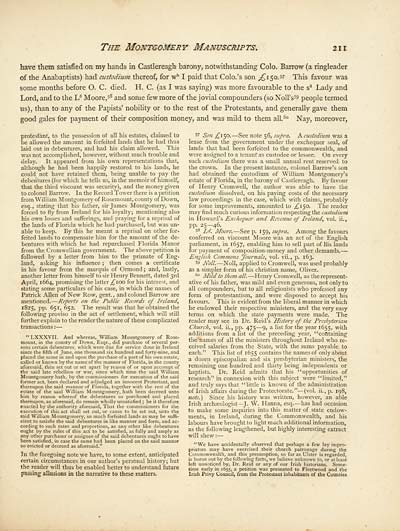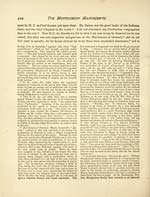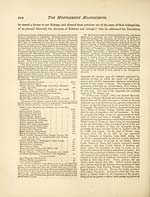Montgomery manuscripts
(225) Page 211
Download files
Complete book:
Individual page:
Thumbnail gallery: Grid view | List view

The Montgomery Manuscripts.
211
have them satisfied on my hands in Castlereagh barony, notwithstanding Colo. Barrow (a ringleader
of the Anabaptists) had custodium thereof, for w h I paid that Colo.'s son ,£150.57 This favour was
some months before O. C. died. H. C. (as I was saying) was more favourable to the s d Lady and
Lord, and to the L d Moore, 58 and some few more of the jovial compounders (so Noll's 5 9 people termed
us), than to any of the Papists' nobility or to the rest of the Protestants, and generally gave them
good gales for payment of their composition money, and was mild to them all. 6 ° Nay, moreover,
protestant, to the possession of all his estates, claimed to
be allowed the amount in forfeited lands that he had thus
laid out in debentures, and had his claim allowed. This
was not accomplished, however, without much trouble and
delay. It appeared from his own representations that,
although he had been happily restored to his lands, he
could not have retained them, being unable to pay the
debentures (for which he tells us, in the memoir of himself,
that the third viscount was security), and the money given
to colonel Barrow. In the Record Tower there is a petition
from William Montgomery of Rosemount, county of Down,
esq., stating that his father, sir James Montgomery, was
forced to fly from Ireland for his loyalty; mentioning also
his own losses and sufferings, and praying for a reprisal of
the lands of Florida which he had purchased, but was un-
able to keep. By this he meant a reprisal on other for-
feited lands to compensate him for the amount of the de-
bentures with which he had repurchased Florida Manor
from the Cromwellian government. The above petition is
followed by a letter from him to the primate of Eng-
land, asking his influence ; then comes a certificate
in his favour from the marquis of Ormond ; and, lastly,
another letter from himself to sir Henry Bennett, dated 3rd
April, 1664, promising the latter £100 for his interest, and
stating some particulars of his case, in which the names of
Patrick Allen of New Row, gent. , and colonel Barrow are
mentioned. — Reports on the Public Records of Ireland,
1825, pp. 651, 652. The result was that he obtained the
following proviso in the act of settlement, which will still
further explain to the reader the nature of these complicated
transactions : —
11 LXXXVII. And whereas, William Mountgomery of Rose-
mount, in the county of Down, Esqr., did purchase of several per-
sons certain debentures, which were due for service done in Ireland
since the fifth of June, one thousand six hundred and forty-nine, and
placed the same in and upon the purchase of a part of his own estate,
called or known by the name of the mannor of Florida, in the county
aforesaid, then set out or set apart by reason of or upon accompt of
the said late rebellion or war, since which time the said William
Mountgomery hath, by the commissioners for execution of the said
former act, been declared and adjudged an innocent Protestant, and
thereupon the said mannor of Florida, together with the rest of the
estate of the said William Mountgomery, hath been decreed unto
him by reason whereof the debentures so purchased and placed
thereupon, as aforesaid, do remain wholly unsatisfied ; be it therefore
enacted by the authority aforesaid, That the commissioners for the
execution of this act shall set out, or cause to be set out, unto the
said William Mountgomery, so much forfeited lands as may be suffi-
cient to satisfie the said debentures in like manner and form, and ac-
cording to such rates and proportions, as any other like debentures
ought by the rules of this act to be satisfied, as fully and amply as
any other purchaser or assignee of the said debentures ought to have
been satisfied, in case the same had been placed on the said mannor
so evicted or decreed as aforesaid."
In the foregoing note we have, to some extent, anticipated
certain circumstances in our author's personal history; but
the reader will thus be enabled better to understand future
passing allusions in the narrative to these matters.
s ? Son £150. — See note 56, supra. A custodium was a
lease from the government under the exchequer seal, of
lands that had been forfeited to the commonwealth, and
were assigned to a tenant as custodee or lessee. On every
such custodium there was a small annual rent reserved to
the crown. In the present instance, colonel Barrow's son
had obtained the custodium of William Montgomery's
estate of Florida, in the barony of Castlereagh. By favour
of Henry Cromwell, the audior was able to have the
custodium dissolved, on his paying costs of the necessary
law proceedings in the case, which with claims, probably
for some improvements, amounted to ^150. The reader
may find much curious information respecting the custodium
in Howard's Exchequer and Revenue 0/ Ireland, vol. ii.,
pp. 25—46.
s 8 Ld. Moore. — See p. 159, supra. Among the favours
conferred on viscount Moore was an act of the English
parliament, in 1657? enabling him to sell part of liis lands
for payment of composition-money and other demands. —
English Commons journals, vol. vii. , p. 163.
59 Noll. — Noll, applied to Cromwell, was used probably
as a simpler form of his christian name, Oliver.
60 Mild to them all. — Henry Cromwell, as the represent-
ative of his father, was mild and even generous, not only to
all compounders, but to all religionists who professed any
form of protestantism, and were disposed to accept his
favours. This is evident from the liberal manner in which
he endowed their respective ministers, and the very easy
terms on which the state payments were made. The
reader may see in Dr. Reid's History of the Presbyterian
Church, vol. ii., pp. 475 — 9, a list for the year 1655, with
additions from a list of the preceding year, "containing
the names of all the ministers throughout Ireland who re-
ceived salaries from the State, with the sums payable to
each." This list of 1655 contains the names of only about
a dozen episcopalian and six presbyterian ministers, the
remaining one hundred and thirty being independents or
baptists. Dr. Reid admits that his "opportunities of
research" in connexion with this subject were "limited,"
and truly says that "little is known of the administration
of Irish affairs during the Protectorate." — (vol. ii., p. 198,
note.) Since his history was written, however, an able
Irish archaeologist — J. W. Hanna, esq. — has had occasion
to make some inquiries into this matter of state endow-
ments, in Ireland, during the Commonwealth, and his
labours have brought to light much additional information,
as the following lengthened, but highly interesting extract
will shew : —
"We have accidentally observed that perhaps a few lay impro-
priators may have exercised their church patronage during the
Commonwealth, and this presumption, so far as Ulster is regarded,
is borne out by the following facts, we believe unknown to, or at least
left unnoticed by, Dr. Reid or any of our Irish historians. Some-
time early in 1655, a petition was presented to Fleetwood and the
Irish Privy Council, from the Protestant inhabitants of the Counties
211
have them satisfied on my hands in Castlereagh barony, notwithstanding Colo. Barrow (a ringleader
of the Anabaptists) had custodium thereof, for w h I paid that Colo.'s son ,£150.57 This favour was
some months before O. C. died. H. C. (as I was saying) was more favourable to the s d Lady and
Lord, and to the L d Moore, 58 and some few more of the jovial compounders (so Noll's 5 9 people termed
us), than to any of the Papists' nobility or to the rest of the Protestants, and generally gave them
good gales for payment of their composition money, and was mild to them all. 6 ° Nay, moreover,
protestant, to the possession of all his estates, claimed to
be allowed the amount in forfeited lands that he had thus
laid out in debentures, and had his claim allowed. This
was not accomplished, however, without much trouble and
delay. It appeared from his own representations that,
although he had been happily restored to his lands, he
could not have retained them, being unable to pay the
debentures (for which he tells us, in the memoir of himself,
that the third viscount was security), and the money given
to colonel Barrow. In the Record Tower there is a petition
from William Montgomery of Rosemount, county of Down,
esq., stating that his father, sir James Montgomery, was
forced to fly from Ireland for his loyalty; mentioning also
his own losses and sufferings, and praying for a reprisal of
the lands of Florida which he had purchased, but was un-
able to keep. By this he meant a reprisal on other for-
feited lands to compensate him for the amount of the de-
bentures with which he had repurchased Florida Manor
from the Cromwellian government. The above petition is
followed by a letter from him to the primate of Eng-
land, asking his influence ; then comes a certificate
in his favour from the marquis of Ormond ; and, lastly,
another letter from himself to sir Henry Bennett, dated 3rd
April, 1664, promising the latter £100 for his interest, and
stating some particulars of his case, in which the names of
Patrick Allen of New Row, gent. , and colonel Barrow are
mentioned. — Reports on the Public Records of Ireland,
1825, pp. 651, 652. The result was that he obtained the
following proviso in the act of settlement, which will still
further explain to the reader the nature of these complicated
transactions : —
11 LXXXVII. And whereas, William Mountgomery of Rose-
mount, in the county of Down, Esqr., did purchase of several per-
sons certain debentures, which were due for service done in Ireland
since the fifth of June, one thousand six hundred and forty-nine, and
placed the same in and upon the purchase of a part of his own estate,
called or known by the name of the mannor of Florida, in the county
aforesaid, then set out or set apart by reason of or upon accompt of
the said late rebellion or war, since which time the said William
Mountgomery hath, by the commissioners for execution of the said
former act, been declared and adjudged an innocent Protestant, and
thereupon the said mannor of Florida, together with the rest of the
estate of the said William Mountgomery, hath been decreed unto
him by reason whereof the debentures so purchased and placed
thereupon, as aforesaid, do remain wholly unsatisfied ; be it therefore
enacted by the authority aforesaid, That the commissioners for the
execution of this act shall set out, or cause to be set out, unto the
said William Mountgomery, so much forfeited lands as may be suffi-
cient to satisfie the said debentures in like manner and form, and ac-
cording to such rates and proportions, as any other like debentures
ought by the rules of this act to be satisfied, as fully and amply as
any other purchaser or assignee of the said debentures ought to have
been satisfied, in case the same had been placed on the said mannor
so evicted or decreed as aforesaid."
In the foregoing note we have, to some extent, anticipated
certain circumstances in our author's personal history; but
the reader will thus be enabled better to understand future
passing allusions in the narrative to these matters.
s ? Son £150. — See note 56, supra. A custodium was a
lease from the government under the exchequer seal, of
lands that had been forfeited to the commonwealth, and
were assigned to a tenant as custodee or lessee. On every
such custodium there was a small annual rent reserved to
the crown. In the present instance, colonel Barrow's son
had obtained the custodium of William Montgomery's
estate of Florida, in the barony of Castlereagh. By favour
of Henry Cromwell, the audior was able to have the
custodium dissolved, on his paying costs of the necessary
law proceedings in the case, which with claims, probably
for some improvements, amounted to ^150. The reader
may find much curious information respecting the custodium
in Howard's Exchequer and Revenue 0/ Ireland, vol. ii.,
pp. 25—46.
s 8 Ld. Moore. — See p. 159, supra. Among the favours
conferred on viscount Moore was an act of the English
parliament, in 1657? enabling him to sell part of liis lands
for payment of composition-money and other demands. —
English Commons journals, vol. vii. , p. 163.
59 Noll. — Noll, applied to Cromwell, was used probably
as a simpler form of his christian name, Oliver.
60 Mild to them all. — Henry Cromwell, as the represent-
ative of his father, was mild and even generous, not only to
all compounders, but to all religionists who professed any
form of protestantism, and were disposed to accept his
favours. This is evident from the liberal manner in which
he endowed their respective ministers, and the very easy
terms on which the state payments were made. The
reader may see in Dr. Reid's History of the Presbyterian
Church, vol. ii., pp. 475 — 9, a list for the year 1655, with
additions from a list of the preceding year, "containing
the names of all the ministers throughout Ireland who re-
ceived salaries from the State, with the sums payable to
each." This list of 1655 contains the names of only about
a dozen episcopalian and six presbyterian ministers, the
remaining one hundred and thirty being independents or
baptists. Dr. Reid admits that his "opportunities of
research" in connexion with this subject were "limited,"
and truly says that "little is known of the administration
of Irish affairs during the Protectorate." — (vol. ii., p. 198,
note.) Since his history was written, however, an able
Irish archaeologist — J. W. Hanna, esq. — has had occasion
to make some inquiries into this matter of state endow-
ments, in Ireland, during the Commonwealth, and his
labours have brought to light much additional information,
as the following lengthened, but highly interesting extract
will shew : —
"We have accidentally observed that perhaps a few lay impro-
priators may have exercised their church patronage during the
Commonwealth, and this presumption, so far as Ulster is regarded,
is borne out by the following facts, we believe unknown to, or at least
left unnoticed by, Dr. Reid or any of our Irish historians. Some-
time early in 1655, a petition was presented to Fleetwood and the
Irish Privy Council, from the Protestant inhabitants of the Counties
Set display mode to:
![]() Universal Viewer |
Universal Viewer | ![]() Mirador |
Large image | Transcription
Mirador |
Large image | Transcription
Images and transcriptions on this page, including medium image downloads, may be used under the Creative Commons Attribution 4.0 International Licence unless otherwise stated. ![]()
| Histories of Scottish families > Montgomery manuscripts > (225) Page 211 |
|---|
| Permanent URL | https://digital.nls.uk/95235627 |
|---|
| Description | A selection of almost 400 printed items relating to the history of Scottish families, mostly dating from the 19th and early 20th centuries. Includes memoirs, genealogies and clan histories, with a few produced by emigrant families. The earliest family history goes back to AD 916. |
|---|

